2024长沙中考英语二轮复习 专题一 第3讲 情态动词课件(共30张PPT)
文档属性
| 名称 | 2024长沙中考英语二轮复习 专题一 第3讲 情态动词课件(共30张PPT) |

|
|
| 格式 | pptx | ||
| 文件大小 | 158.5KB | ||
| 资源类型 | 教案 | ||
| 版本资源 | 通用版 | ||
| 科目 | 英语 | ||
| 更新时间 | 2024-04-01 00:00:00 | ||
图片预览

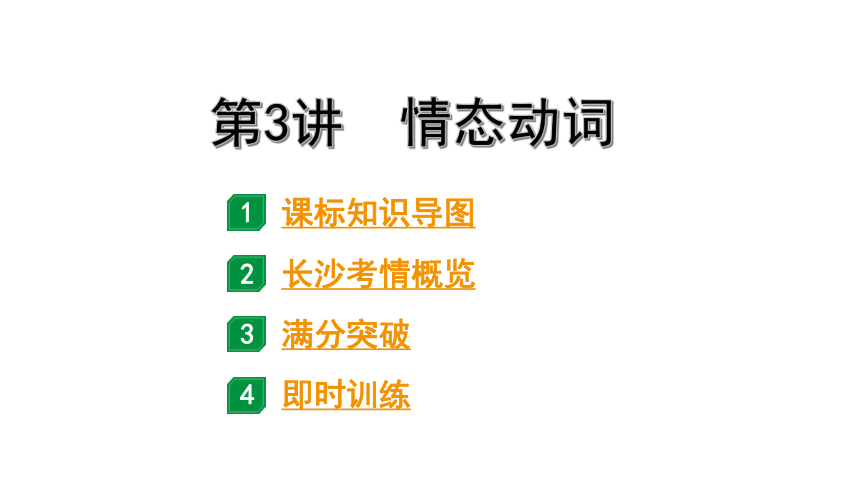
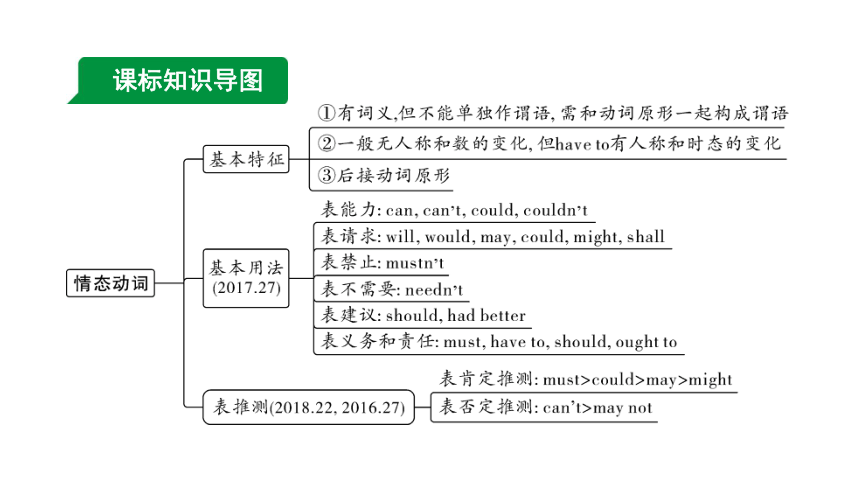
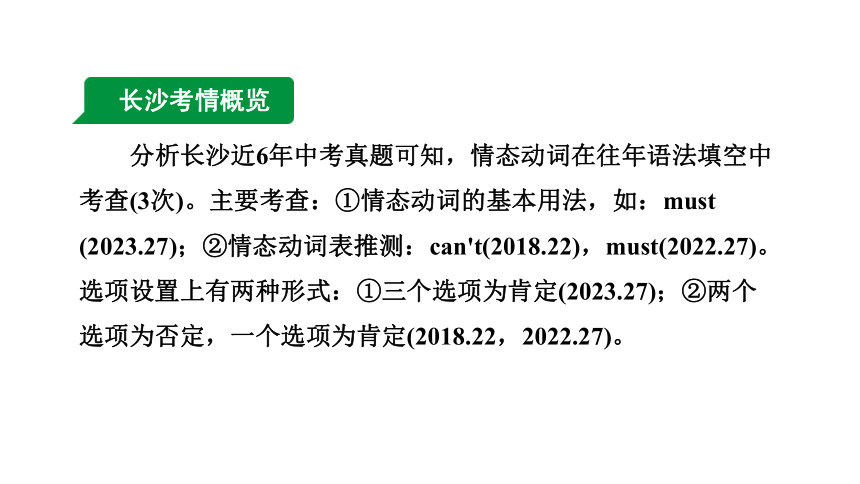
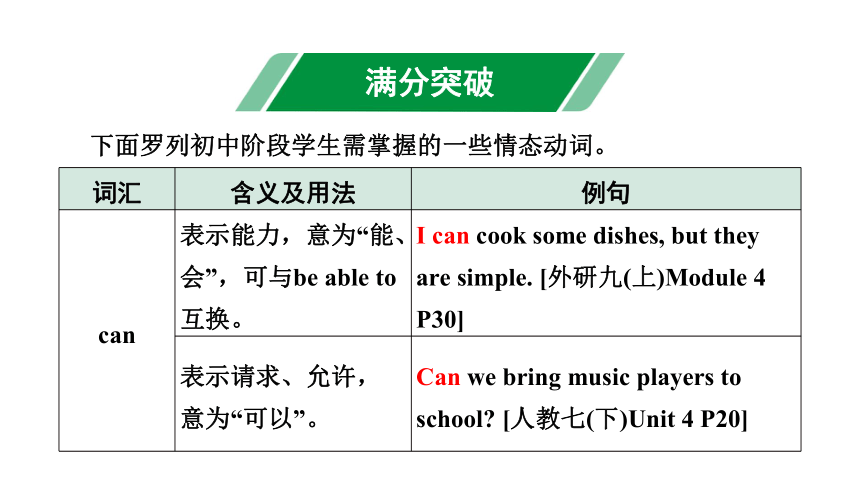
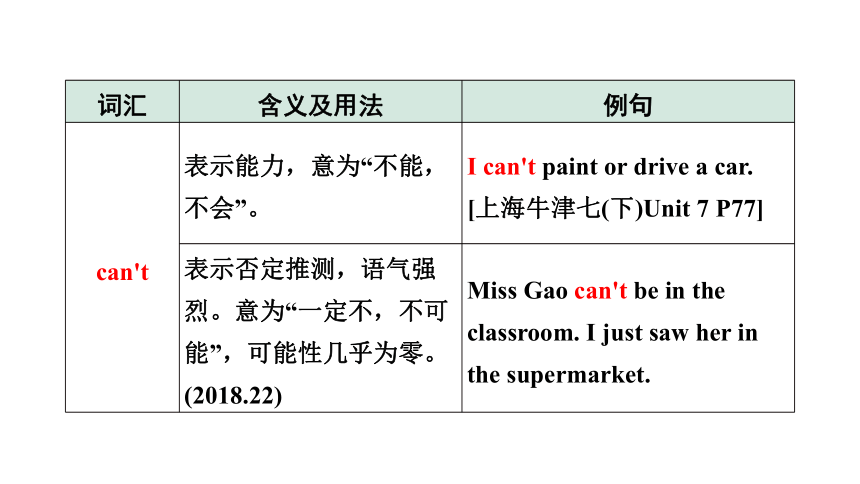
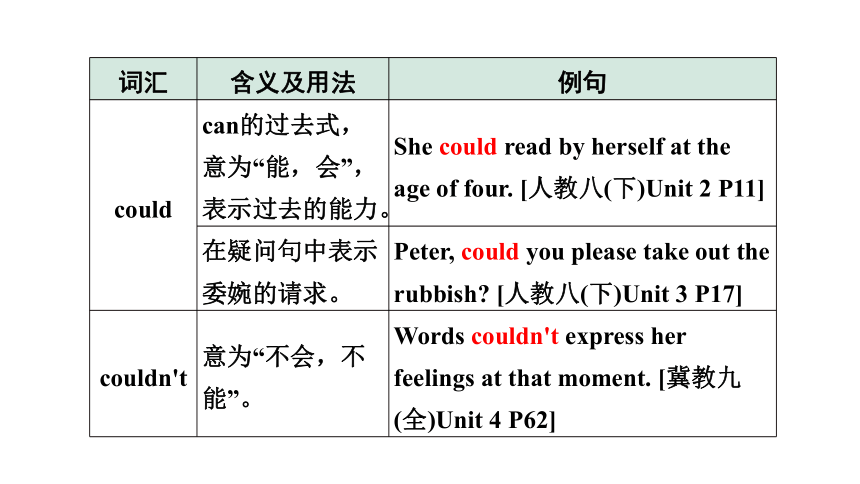
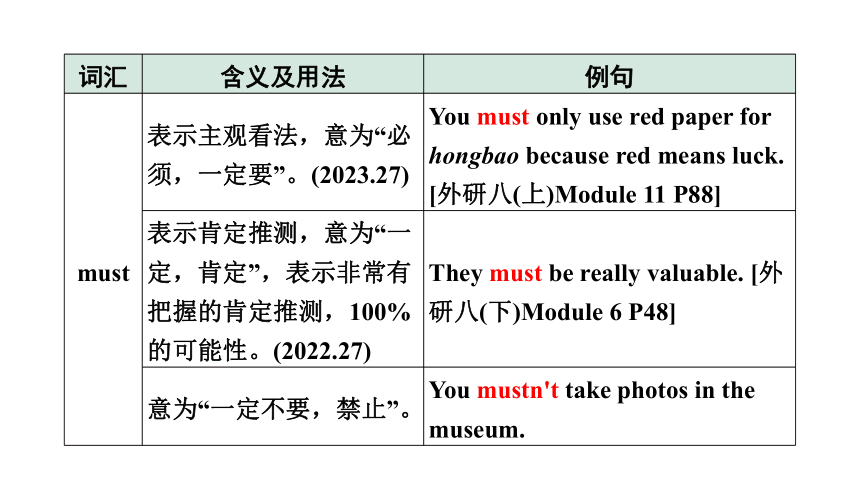
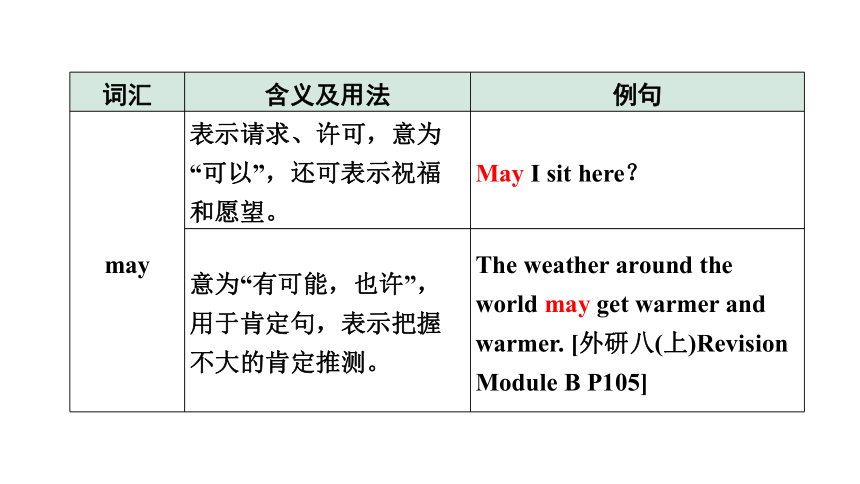
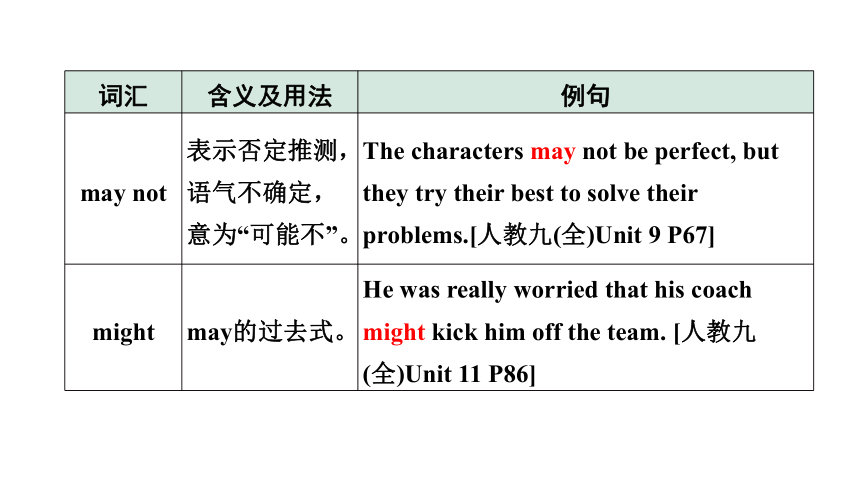

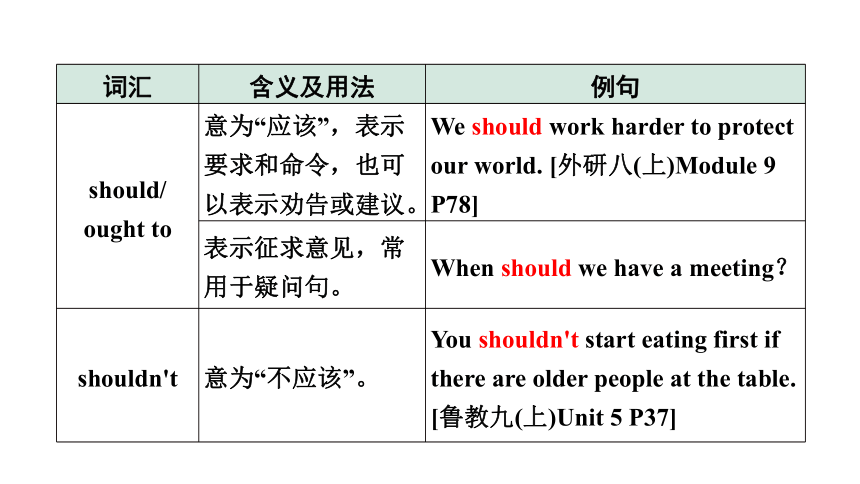
文档简介
(共30张PPT)
最灵活的动词
专 题 一
课标知识导图
1
满分突破
3
即时训练
4
第3讲 情态动词
长沙考情概览
2
课标知识导图
长沙考情概览
分析长沙近6年中考真题可知,情态动词在往年语法填空中考查(3次)。主要考查:①情态动词的基本用法,如:must
(2023.27);②情态动词表推测:can't(2018.22),must(2022.27)。选项设置上有两种形式:①三个选项为肯定(2023.27);②两个选项为否定,一个选项为肯定(2018.22,2022.27)。
满分突破
下面罗列初中阶段学生需掌握的一些情态动词。
词汇 含义及用法 例句
can 表示能力,意为“能、会”,可与be able to互换。 I can cook some dishes, but they are simple. [外研九(上)Module 4 P30]
表示请求、允许,意为“可以”。 Can we bring music players to school [人教七(下)Unit 4 P20]
词汇 含义及用法 例句
can't 表示能力,意为“不能,不会”。 I can't paint or drive a car. [上海牛津七(下)Unit 7 P77]
表示否定推测,语气强烈。意为“一定不,不可能”,可能性几乎为零。(2018.22) Miss Gao can't be in the classroom. I just saw her in the supermarket.
词汇 含义及用法 例句
could can的过去式,意为“能,会”,表示过去的能力。 She could read by herself at the age of four. [人教八(下)Unit 2 P11]
在疑问句中表示委婉的请求。 Peter, could you please take out the rubbish [人教八(下)Unit 3 P17]
couldn't 意为“不会,不能”。 Words couldn't express her feelings at that moment. [冀教九(全)Unit 4 P62]
词汇 含义及用法 例句
must 表示主观看法,意为“必须,一定要”。(2023.27) You must only use red paper for hongbao because red means luck. [外研八(上)Module 11 P88]
表示肯定推测,意为“一定,肯定”,表示非常有把握的肯定推测,100%的可能性。(2022.27) They must be really valuable. [外研八(下)Module 6 P48]
意为“一定不要,禁止”。 You mustn't take photos in the museum.
词汇 含义及用法 例句
may 表示请求、许可,意为“可以”,还可表示祝福和愿望。 May I sit here?
意为“有可能,也许”,用于肯定句,表示把握不大的肯定推测。 The weather around the world may get warmer and warmer. [外研八(上)Revision Module B P105]
词汇 含义及用法 例句
may not 表示否定推测,语气不确定,意为“可能不”。 The characters may not be perfect, but they try their best to solve their problems.[人教九(全)Unit 9 P67]
might may的过去式。 He was really worried that his coach might kick him off the team. [人教九(全)Unit 11 P86]
词汇 含义及用法 例句
might 表示请求、许可,语气比may更委婉。 He asked if he might go home.
表推测,意为“有可能,也许”,可能性低于may。语气缓和,较委婉。 Bears might think our rubbish is food. [外研九(下)Module 4 P28]
have to 意为“不得不”,多表示客观必要。 Danny, I have to go to the supermarket. [冀教七(上)Unit 4 P52]
词汇 含义及用法 例句
should/ ought to 意为“应该”,表示要求和命令,也可以表示劝告或建议。 We should work harder to protect our world. [外研八(上)Module 9 P78]
表示征求意见,常用于疑问句。 When should we have a meeting?
shouldn't 意为“不应该”。 You shouldn't start eating first if there are older people at the table. [鲁教九(上)Unit 5 P37]
词汇 含义及用法 例句
need 意为“需要”,主要用于否定句和疑问句中。 You need practise speaking every day if you want to improve your spoken English. [外研九(下)Module 7 P34]
needn't need的否定形式,表示“不必,无需”。 You needn't help me, because I can do it by myself.
词汇 含义及用法 例句
will 表示询问、请求,可用于疑问句中,常用于第二人称。 Will you come with us [冀教七(下)Unit 1 P15]
would will的过去式,表示自愿做或主动提出做某事,表意志、愿望或决心等。 Betty would like to see the Beijing Opera again. [外研八(上)Module 5 P35]
词汇 含义及用法 例句
shall 表示请求或征求对方意见,多用于第一、三人称,构成疑问句。 Shall we get each of them a card and gift to say thank you [人教九(全)Unit 14 P106]
had better 意为“最好”。 You had better have breakfast every day to keep healthy.
(1)May I...?表示请求时,否定回答用mustn't或can't。如:
—May I buy some candies 我可以买些糖果吗?
—No, you can't/mustn't. 不,你不能/不许(买)。
(2)由must引导的一般疑问句,肯定回答用must或have to,否定回答用needn't或don't have to。如:
—Must I finish the homework today?我今天必须完成作业吗?
—No, you needn't/don't have to.不,你不需要。
拓 展
(3)回答以could引出的一般疑问句时,用can,不用could。如:
—Could I use your mobile phone?我可以用你的手机吗?
—Yes, you can. / No, you can't.是的,你可以。/不,你不可以。
(4)表示肯定推测的情态动词有:must> can/could> may> might(按语气强弱)
表示否定推测的情态动词有:can't> may not(按语气强弱)
即时训练
1. (2018年22题)—Is the man over there Adam
—It ________ be him. He has gone to Hong Kong on vacation.
A. must B. can't C. mustn't
长沙6年真题
微语境夯基
B
2. (2023年27题)—Philips, ________ you make so much noise when your little sister is sleeping
—Sorry, Mum. I'll stop right away.
A. can B. may C. must
3. (2022年27题)—Finally, they came back.
—They ________ be hungry after such a long walk.
A. can't B. must C. needn't
C
B
4. — ________ you give me a hand I can't put up the poster by myself.
—No problem.
A. Could B. Should C. Need
5. I think Emily ________ have read this book. She knows all the stories in the book.
A. must B. might C. could
拓展提升
A
B
6. The fashion magazine ________ be Nancy's. She is interested in that.
A. would B. should C. could
7. —Mom, you are being too hard on me. Everyone makes mistakes.
—That's true. But you ________ make the same mistakes over and over again.
A. mustn't B. may C. shouldn't
C
C
8. —Look! People outside are wearing thick coats.
—The weather ________ be very cold.
A. might B. must C. can't
9. — ________ I hand in the report tomorrow morning, Miss Lee
—No, you needn't. The deadline is the day after tomorrow.
A. Need B. Shall C. Must
10. You are not allowed to play with fire in the forest. It ________ kill plants, animals and even people.
A. may B. won't C. couldn't
B
C
A
11. You ________ be able to control all the things that happen to you, but you can decide not to be influenced by them.
A. needn't B. may not C. should
12. —Some people don't show their talents at the very beginning.
—I agree. Even Einstein ________ read until he was seven.
A. couldn't B. wouldn't C. could
13. —Allen, shall we go to the bookstore this afternoon
—I'm sorry, David. I ________ meet my cousin at the train station.
A. have to B. can C. may
B
A
A
14. Don't be upset! You ________ cheer up and try it one more time.
A. could B. should C. would
15. —The tall man with glasses over there looks like our English teacher.
—It ________ be him. He has gone to the countryside as a volunteer teacher this term.
A. mustn't B. shouldn't C. can't
B
C
微语篇提能
I.
当断不断,反受其乱
Tom lived with his grandfather, who was regarded as the wisest man in the village. Many people 1 go to his grandfather's for advice or help.
One day, Tom and his grandfather saw three men walking together. They found a single log(独木) bridge halfway, below which was a deep river.
外文素材选自One Story A Day Book 10
The first man didn't hesitate(犹豫) to step on the bridge and he thought he 2 make it to the other side of the river. The second man came close to the bridge. When seeing the deep river, he doubted if he 3 make it. Encouraged by the first man, he put his feet on the bridge. Finally, he got to the other side safely. The third man 4 be brave enough. His whole body was shaking. But he 5 cross the bridge as it was getting dark and behind him were some hungry wolves. Only after few steps, he fell into the river.
Seeing the surprised look on Tom's face, Grandfather said softly, “When meeting difficulties, the more time it takes to hesitate, the higher price you'll pay.”
( )1. A. would B. should C. could
( )2. A. must B. may C. would
( )3. A. shall B. could C. must
( )4. A. shouldn't B. wouldn't C. couldn't
( )5. A. had to B. ought to C. could
A
A
B
C
A
Ⅱ. With the development of economics, the problem of the left behind children(留守儿童) has become a serious social problem. More and more people have realized we 1.________ do something to help them.
The biggest problem is that the children are all hungry for the love from their parents. Many of them 2.________just get a call or a letter from their parents half a year, a year or even several years. So some children 3.________ remember clearly what their parents look like. When meeting troubles, they 4.________ solve them by themselves.
should
can
can't
have to
There are also many other problems of the left behind children, such as having no ability to protect themselves, having unhealthy lifestyles and so on.
In a word, the government, families and schools 5.________ try their best together to solve all the problems of the left behind children.
must
最灵活的动词
专 题 一
课标知识导图
1
满分突破
3
即时训练
4
第3讲 情态动词
长沙考情概览
2
课标知识导图
长沙考情概览
分析长沙近6年中考真题可知,情态动词在往年语法填空中考查(3次)。主要考查:①情态动词的基本用法,如:must
(2023.27);②情态动词表推测:can't(2018.22),must(2022.27)。选项设置上有两种形式:①三个选项为肯定(2023.27);②两个选项为否定,一个选项为肯定(2018.22,2022.27)。
满分突破
下面罗列初中阶段学生需掌握的一些情态动词。
词汇 含义及用法 例句
can 表示能力,意为“能、会”,可与be able to互换。 I can cook some dishes, but they are simple. [外研九(上)Module 4 P30]
表示请求、允许,意为“可以”。 Can we bring music players to school [人教七(下)Unit 4 P20]
词汇 含义及用法 例句
can't 表示能力,意为“不能,不会”。 I can't paint or drive a car. [上海牛津七(下)Unit 7 P77]
表示否定推测,语气强烈。意为“一定不,不可能”,可能性几乎为零。(2018.22) Miss Gao can't be in the classroom. I just saw her in the supermarket.
词汇 含义及用法 例句
could can的过去式,意为“能,会”,表示过去的能力。 She could read by herself at the age of four. [人教八(下)Unit 2 P11]
在疑问句中表示委婉的请求。 Peter, could you please take out the rubbish [人教八(下)Unit 3 P17]
couldn't 意为“不会,不能”。 Words couldn't express her feelings at that moment. [冀教九(全)Unit 4 P62]
词汇 含义及用法 例句
must 表示主观看法,意为“必须,一定要”。(2023.27) You must only use red paper for hongbao because red means luck. [外研八(上)Module 11 P88]
表示肯定推测,意为“一定,肯定”,表示非常有把握的肯定推测,100%的可能性。(2022.27) They must be really valuable. [外研八(下)Module 6 P48]
意为“一定不要,禁止”。 You mustn't take photos in the museum.
词汇 含义及用法 例句
may 表示请求、许可,意为“可以”,还可表示祝福和愿望。 May I sit here?
意为“有可能,也许”,用于肯定句,表示把握不大的肯定推测。 The weather around the world may get warmer and warmer. [外研八(上)Revision Module B P105]
词汇 含义及用法 例句
may not 表示否定推测,语气不确定,意为“可能不”。 The characters may not be perfect, but they try their best to solve their problems.[人教九(全)Unit 9 P67]
might may的过去式。 He was really worried that his coach might kick him off the team. [人教九(全)Unit 11 P86]
词汇 含义及用法 例句
might 表示请求、许可,语气比may更委婉。 He asked if he might go home.
表推测,意为“有可能,也许”,可能性低于may。语气缓和,较委婉。 Bears might think our rubbish is food. [外研九(下)Module 4 P28]
have to 意为“不得不”,多表示客观必要。 Danny, I have to go to the supermarket. [冀教七(上)Unit 4 P52]
词汇 含义及用法 例句
should/ ought to 意为“应该”,表示要求和命令,也可以表示劝告或建议。 We should work harder to protect our world. [外研八(上)Module 9 P78]
表示征求意见,常用于疑问句。 When should we have a meeting?
shouldn't 意为“不应该”。 You shouldn't start eating first if there are older people at the table. [鲁教九(上)Unit 5 P37]
词汇 含义及用法 例句
need 意为“需要”,主要用于否定句和疑问句中。 You need practise speaking every day if you want to improve your spoken English. [外研九(下)Module 7 P34]
needn't need的否定形式,表示“不必,无需”。 You needn't help me, because I can do it by myself.
词汇 含义及用法 例句
will 表示询问、请求,可用于疑问句中,常用于第二人称。 Will you come with us [冀教七(下)Unit 1 P15]
would will的过去式,表示自愿做或主动提出做某事,表意志、愿望或决心等。 Betty would like to see the Beijing Opera again. [外研八(上)Module 5 P35]
词汇 含义及用法 例句
shall 表示请求或征求对方意见,多用于第一、三人称,构成疑问句。 Shall we get each of them a card and gift to say thank you [人教九(全)Unit 14 P106]
had better 意为“最好”。 You had better have breakfast every day to keep healthy.
(1)May I...?表示请求时,否定回答用mustn't或can't。如:
—May I buy some candies 我可以买些糖果吗?
—No, you can't/mustn't. 不,你不能/不许(买)。
(2)由must引导的一般疑问句,肯定回答用must或have to,否定回答用needn't或don't have to。如:
—Must I finish the homework today?我今天必须完成作业吗?
—No, you needn't/don't have to.不,你不需要。
拓 展
(3)回答以could引出的一般疑问句时,用can,不用could。如:
—Could I use your mobile phone?我可以用你的手机吗?
—Yes, you can. / No, you can't.是的,你可以。/不,你不可以。
(4)表示肯定推测的情态动词有:must> can/could> may> might(按语气强弱)
表示否定推测的情态动词有:can't> may not(按语气强弱)
即时训练
1. (2018年22题)—Is the man over there Adam
—It ________ be him. He has gone to Hong Kong on vacation.
A. must B. can't C. mustn't
长沙6年真题
微语境夯基
B
2. (2023年27题)—Philips, ________ you make so much noise when your little sister is sleeping
—Sorry, Mum. I'll stop right away.
A. can B. may C. must
3. (2022年27题)—Finally, they came back.
—They ________ be hungry after such a long walk.
A. can't B. must C. needn't
C
B
4. — ________ you give me a hand I can't put up the poster by myself.
—No problem.
A. Could B. Should C. Need
5. I think Emily ________ have read this book. She knows all the stories in the book.
A. must B. might C. could
拓展提升
A
B
6. The fashion magazine ________ be Nancy's. She is interested in that.
A. would B. should C. could
7. —Mom, you are being too hard on me. Everyone makes mistakes.
—That's true. But you ________ make the same mistakes over and over again.
A. mustn't B. may C. shouldn't
C
C
8. —Look! People outside are wearing thick coats.
—The weather ________ be very cold.
A. might B. must C. can't
9. — ________ I hand in the report tomorrow morning, Miss Lee
—No, you needn't. The deadline is the day after tomorrow.
A. Need B. Shall C. Must
10. You are not allowed to play with fire in the forest. It ________ kill plants, animals and even people.
A. may B. won't C. couldn't
B
C
A
11. You ________ be able to control all the things that happen to you, but you can decide not to be influenced by them.
A. needn't B. may not C. should
12. —Some people don't show their talents at the very beginning.
—I agree. Even Einstein ________ read until he was seven.
A. couldn't B. wouldn't C. could
13. —Allen, shall we go to the bookstore this afternoon
—I'm sorry, David. I ________ meet my cousin at the train station.
A. have to B. can C. may
B
A
A
14. Don't be upset! You ________ cheer up and try it one more time.
A. could B. should C. would
15. —The tall man with glasses over there looks like our English teacher.
—It ________ be him. He has gone to the countryside as a volunteer teacher this term.
A. mustn't B. shouldn't C. can't
B
C
微语篇提能
I.
当断不断,反受其乱
Tom lived with his grandfather, who was regarded as the wisest man in the village. Many people 1 go to his grandfather's for advice or help.
One day, Tom and his grandfather saw three men walking together. They found a single log(独木) bridge halfway, below which was a deep river.
外文素材选自One Story A Day Book 10
The first man didn't hesitate(犹豫) to step on the bridge and he thought he 2 make it to the other side of the river. The second man came close to the bridge. When seeing the deep river, he doubted if he 3 make it. Encouraged by the first man, he put his feet on the bridge. Finally, he got to the other side safely. The third man 4 be brave enough. His whole body was shaking. But he 5 cross the bridge as it was getting dark and behind him were some hungry wolves. Only after few steps, he fell into the river.
Seeing the surprised look on Tom's face, Grandfather said softly, “When meeting difficulties, the more time it takes to hesitate, the higher price you'll pay.”
( )1. A. would B. should C. could
( )2. A. must B. may C. would
( )3. A. shall B. could C. must
( )4. A. shouldn't B. wouldn't C. couldn't
( )5. A. had to B. ought to C. could
A
A
B
C
A
Ⅱ. With the development of economics, the problem of the left behind children(留守儿童) has become a serious social problem. More and more people have realized we 1.________ do something to help them.
The biggest problem is that the children are all hungry for the love from their parents. Many of them 2.________just get a call or a letter from their parents half a year, a year or even several years. So some children 3.________ remember clearly what their parents look like. When meeting troubles, they 4.________ solve them by themselves.
should
can
can't
have to
There are also many other problems of the left behind children, such as having no ability to protect themselves, having unhealthy lifestyles and so on.
In a word, the government, families and schools 5.________ try their best together to solve all the problems of the left behind children.
must
同课章节目录
- 词法
- 名词
- 动词和动词短语
- 动词语态
- 动词时态
- 助动词和情态动词
- 非谓语动词
- 冠词
- 代词
- 数词和量词
- 形容词副词及其比较等级
- 介词和介词短语
- 连词和感叹词
- 构词法
- 相似、相近词比较
- 句法
- 陈述句
- 一般疑问句和否定疑问句
- 特殊疑问句及选择疑问句
- 反意疑问句
- 存在句(There be句型)
- 宾语从句
- 定语从句
- 状语从句
- 主谓一致问题
- 简单句
- 并列句
- 复合句
- 主谓一致
- 主、表语从句
- 名词性从句
- 直接引语和间接引语
- 虚拟语气
- 感叹句
- 强调句
- 倒装句
- 祈使句
- 句子的成分
- 句子的分类
- 题型专区
- 单项选择部分
- 易错题
- 完形填空
- 阅读理解
- 词汇练习
- 听说训练
- 句型转换
- 补全对话
- 短文改错
- 翻译
- 书面表达
- 任务型阅读
- 语法填空
- 其他资料
